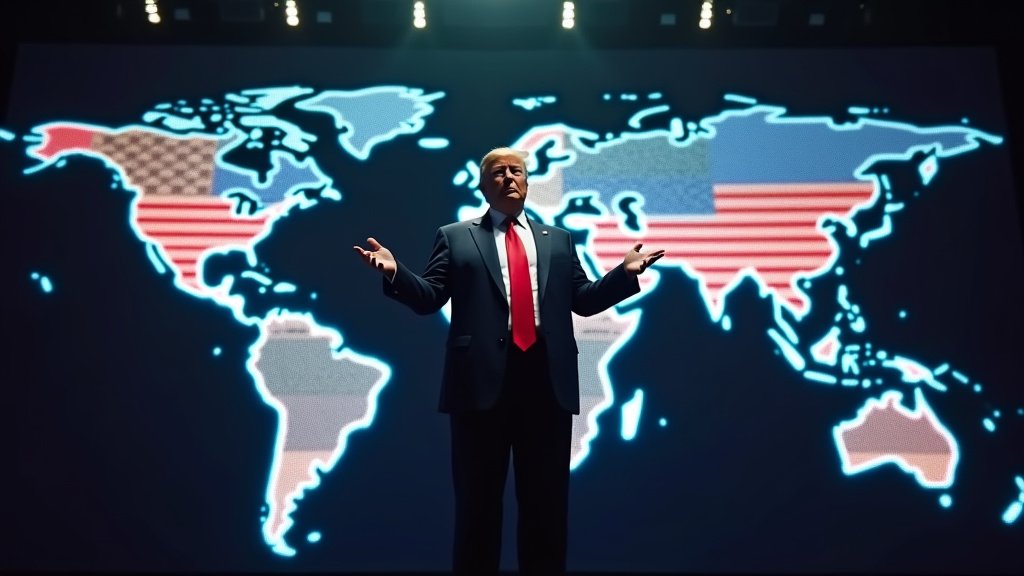A significant ideological and strategic realignment appears to be underway within the United States, a shift increasingly influenced by the enduring legacy of former President Donald Trump. This transformation, examined in detail by the Royal United Services Institute (RUSI), is not confined to the former president himself but is being embraced and amplified by a new generation of figures positioning themselves for future leadership.
The Trumpian Blueprint for 2028 and Beyond
Central to this emerging trend are individuals like J.D. Vance, the Ohio Senator. Vance, who has received notable backing from tech entrepreneur Peter Thiel and was recently referred to by Elon Musk as “the next president of the United States,” is actively cultivating an image as a potential successor for 2028. His approach involves adopting core tenets of Trumpian ideology, signalling a potential departure from traditional Republican foreign policy stances.
These embraced ideals include a marked skepticism of long-standing alliances, a hardened anti-immigration posture, palpable hostility towards free trade agreements, and a critique of American military engagement framed as detrimental to the economic well-being of the working class. These positions, echoed by other figures who served in or aligned with the Trump administration, such as Peter Hegseth, suggest a deeper, potentially more lasting shift in the party’s orientation.
Shifting Public Opinion on Foreign Aid
The evolving political landscape coincides with discernible changes in American public perceptions regarding international engagement and foreign policy priorities. Polling data provides crucial insight into these shifts.
For instance, approximately two-thirds of Americans believe that cutting funding for the U.S. Agency for International Development (USAID) would likely lead to increased death or humanitarian crises in other parts of the world. Simultaneously, nearly half of those polled think that redirecting such funds would result in more money being available for domestic issues or contribute to deficit reduction. Despite these views on redirection, most Americans still express opposition to entirely eliminating humanitarian aid. Interestingly, the public tends to overestimate the current level of U.S. spending on such assistance.
Diverging Priorities: Security vs. Values
Analysis of public opinion reveals a hierarchy of foreign policy concerns that cuts across partisan lines, although with differing levels of intensity. Core American preoccupations, broadly shared by both Democrats and Republicans, centre on tangible security threats and economic interests. These include the prevention of terrorism, preventing nuclear proliferation, securing reliable energy supplies, and promoting favorable trade policies that benefit the United States.
In contrast, values-based initiatives consistently rank lower in priority. Providing humanitarian assistance, building democracies abroad, and fostering economic development in other nations are seen as less urgent concerns for the average American. While these objectives receive more support from Democrats than Republicans, they do not command the same broad, cross-party consensus as the security and economic priorities.
Navigating Support for Alliances
Despite the rise of voices skeptical of international commitments, public support for defending allies’ security remains notable, albeit not overwhelming. Small majorities express support for this principle generally (58%) and specifically for defending Ukraine (50%). Furthermore, there is continued approval for working through multilateral bodies like the United Nations (UN) and the North Atlantic Treaty Organization (NATO), with around 60% of Americans approving of such cooperation.
This data presents a complex picture: while a segment of the political elite, influenced by Trump’s legacy, advocates for a more isolationist or transactional foreign policy, the American public retains a degree of support for alliances and multilateral engagement. However, this support is not unconditional and appears balanced against domestic concerns and perceived core interests like counter-terrorism and economic security.
Implications for Global Partners
The trends identified by RUSI and reflected in polling data signal a potential recalibration of America’s role on the world stage. For traditional allies, particularly in Europe, understanding this evolving political dynamic and public sentiment is crucial. The potential rise of leaders deeply influenced by Trump’s “America First” approach, coupled with public priorities that sometimes favour domestic concerns over international aid and values-based initiatives, presents a clear challenge to the status quo of transatlantic relations and global cooperation. Navigating this shifting landscape will require careful diplomacy and a deep understanding of the new currents shaping American foreign policy.












